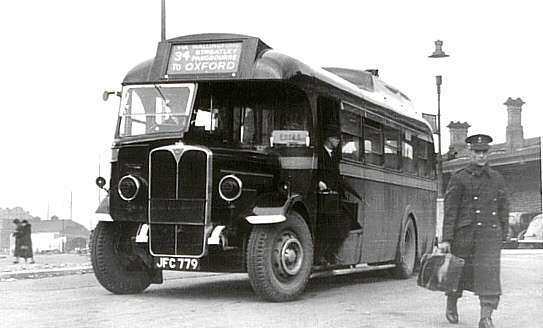On Thursday 12th February the History Society listened to Michael Bartlett who enthusiastically told us about what it was like to travel on the roads in the forties.
Buses where his initial interest. As a boy, living in Morden in the forties, he could observe all the different types and makes of bus then being used by London Transport. The Bus Stop was right outside his house.
His passion about forties motoring was enhanced by the acquisition of every copy of the weekly magazine Autocar produced during the decade. A collection he still retains to this day.
Studying these Autocar Magazines led him to prepare his fascinating story. Some highlights of which are reflected below.
All vehicles to be used after dark had to have white flashes painted on the mudguards and along their sides. The blackout made it difficult to see clearly at night and so any aid to vision was some small help. Headlights had to be shrouded, which meant that drivers fumbled their way forward often ending in the ditch or buried into roadworks. It was said that there were more casualties on the road than Hitler inflicted on us with his bombs.
As petrol rationing took effect public transport was stretched to the limit with overloaded buses providing an essential service in getting people to and from work. Long distance journeys were curtailed and coaches such as those used on the Greenline service were converted into emergency ambulances.
Private motoring was still possible but shortages of rubber for tyres and lead for batteries together with petrol rationing severely restricted movement. Vehicles travelling around coastal areas required a permit and identity. The Homeguard checked these at roadblocks.
Increasingly vehicles were taken off the road and immobilised. The Police received the immobilising part for safe keeping during the conflict. If your vehicle was for essential use you had to immobilise it when parked. Otherwise the Police or Homeguard would do it for you, by letting all the tyres down.
Every attempt was done to confuse the invader by removing signposts and displaying coded destination blinds on buses. Unless you were familiar with your route and destination this practice inevitably caused confusion amongst the indigenous population.
As petrol became even scarcer other methods of fuel were introduced. It was not uncommon to see gasbags on top of cars filled with town gas as a fuel. Many vehicles towed a special trailer, which generated producer gas from coke.
After the war things didn’t get any better in spite of the desire to get motoring again. New cars were in very short supply due to lack of materials. Many cars immobilised during the war were never sore the light of day. Ex-service vehicles were now redundant; but to acquire one wrapped you in endless red tape to the point that people just didn’t bother. Eventually these vehicles were sold at auction.
By the end of the forties Public Transport was in its heyday, but it wouldn’t be long before the private car held sway.
Malcolm Kindell

